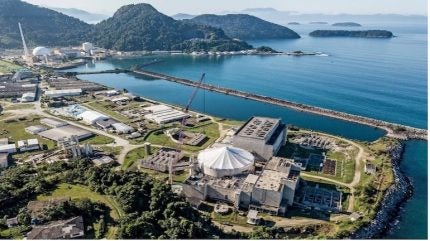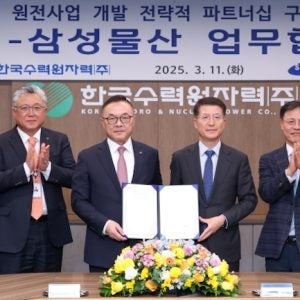
The Brazilian nuclear utility Eletronuclear, a subsidiary of the national electricity group Eletrobras, has adopted a series of strategic measures to improve management and strengthen the financial sustainability of the company. These were approved by the Board of Directors, on 27 January and the new organisational structure will come into force on 1 April.
This includes the revision of the company’s organisational chart, reduction of operational expenses with respect to Personnel, Material, Third-Party and Other Services (PMSO – Pessoal, Material, Serviços de Terceiros e Outros), as well as the collection of maintenance costs of residential villages and, also, the adoption of a voluntary dismissal plan (PVD- plano de demissão voluntária).
These initiatives are part of a set of actions intended to ensure improvements in the current governance model and enable the continuity of the construction of Angra 3.
Angra NPP has two operating pressurised water reactors (PWRs) – the 640 MWe Angra 1, supplied by US Westinghouse Electric Company, which was connected to the grid in 1985 and the 1,350 MWe Angra 2, supplied by Siemens, which began operation in 2001.
Construction of Angra 3, which features a Siemens/KWU pressurised water reactor, began in 1984 but was suspended after two years. The project resumed in 2006 and first concrete was poured in 2010. However, work stopped again in 2015 following allegations of corruption involving government contracts. The unit was then 65% complete. In 2022, Eletronuclear ordered construction to restart but in April 2023 the city government of Angra dos Reis ordered work to stop again citing various issues including the promised payment of compensation.
According to Tribuna Livre, the immediate issue is just political and due to stubbornness on the part of the Angra mayor, Fernando Jordão, in refusing to grant a licence for the work before receiving from Eletronuclear compensation due to the city, which exceed the BRL260m ($45m). “The stoppage of the Angra 3 work depends much less on an end of this local imbroglio than on the federal government’s own momentary uncertainty regarding the cost of completing the new plant and the difficulties of financial management at Eletronuclear itself,” the paper said.
In September 2024, Eletronuclear received the results of a study on Angra 3 of the NPP prepared by the National Bank for Economic & Social Development (BNDES – Banco Nacional de Desenvolvimento Econômico e Social). The study looked into the technical, economic and legal feasibility of the project. It concluded that overall cost of abandoning Angra 3 may exceed BRL21bn ($3.6bn), while the cost to finalise the construction is estimated at around BRL23bn, and the amount already invested in the work is almost BRL12bn.
The organisational restructuring is expected to result in an estimated savings of BRL3m a year. The restructuring of the company is intended to result in increased efficiency, agility and a reduction of expenses, providing:
- Reduction of hierarchical levels to optimise decision making;
- Elimination of overlapping activities, improving productivity; and
- Reduction of four superintendencies and 36 managements/advisory positions.
While the restructuring mostly affects the corporate areas, there are also changes in operation and engineering. The changes were designed for greater agility and improvements in communication and deliveries to internal customers, resulting in improved reliability and operational safety.
In addition, the new organisational chart aligns with the current stage of the Angra 3 project. The previous planning provided for the completion of the plant in 2028, but with the new estimates the entry into operation is now projected for 2031. In this way, the new format allows a better use of labour, relocating employees who were focused on the operation and engineering services of the unit to the two plants in operation (Angra 1&2).
“The new Angra 3 organisation chart has been adjusted to the current stage of the project, providing the use of trained human resources for other important fronts”, explained Eletronuclear President Raul Lycurgo.
The previous organisational chart, which had been in force since 2022, had more than 116 leadership positions while the new structure reduces this to 73 positions. Thus 43 top positions will be eliminated or incorporated into other areas for resource optimisation. “This organisational reformulation allows for a leaner and more efficient model, aligned with good industry practices, without compromising the safety and quality of services provided,” Lycurgo stressed.
The initiative is not just about the dismissal of employees, but readjusting the organisational structure to make it more compatible with the needs of the company and the current reality of the Angra 3 project, he added.
Since 2021, Eletronuclear’s PMSO costs were more than 50% above the amount granted in tariffs by the National Electric Energy Agency (Aneel – Agência Nacional de Energia Elétrica). In 2022, the PMSO tariffs from Aneel totalled BRL 1.1bn, but the company spent BRL 1.6bn. That meant BRL 500m was spent by the company without tariff coverage. The following year, Aneel also allocated BRL 1.1bn but spending was BRL 1.78bn. was again R$1.1 billion, but the company spent R$1.78 billion. In 2023, the budget for 2024 anticipated spending of BRL2.4bn, while Aneel’s allocation was BRL 1.4bn. Rationalisation measures already implemented by
Eletronuclear’s current management was able to reduce spending to 2024 to RL1.9bn, but this still exceeded Aneel’s allocation. The goal is to achieve balance by the end of 2026. “The reduction of PMSO costs is essential to ensure the economic viability of Eletronuclear and the continuity of strategic projects, such as Angra 3 making these changes in the organisation chart necessary” Lycurgo noted.
New strategies include a revision of contracts, optimisation of processes, stricter control of personnel expenses and staff reduction. In addition, the company impose fees to pay for maintenance services of residential villas intended for Angra employees. The measure, which is not a rent, aims to cover expenses such as cleaning, water, electricity, telephone etc.
The new 2025-2029 Business & Management Plan (2025-2029 PNG – Plano de Negócios e Gestão) establishes strategic guidelines for the next five years, prioritising safety, reliability and financial sustainability. The plan is based on the experience of international nuclear operators and considers different scenarios for the resumption of works at Angra 3, in line with government decisions.
The PNG includes the Angra 1 life extension project and operational efficiency targets, as well as strengthening corporate governance of the company. “Our strategic planning reflects our commitment to continuous management improvement and the search for increasingly reliable operation” Lycurgo said.






